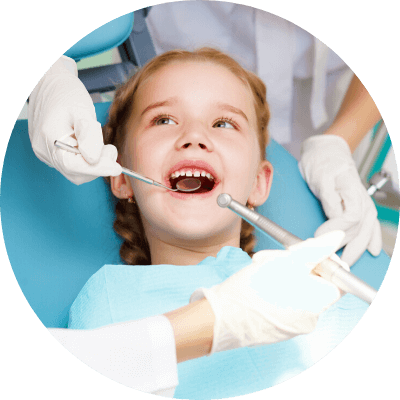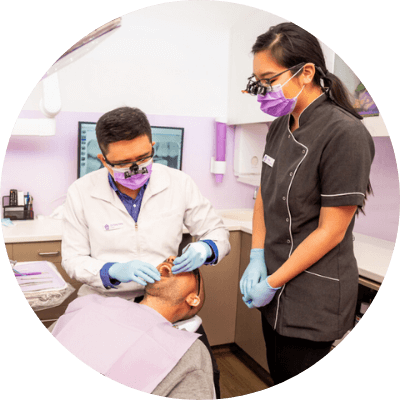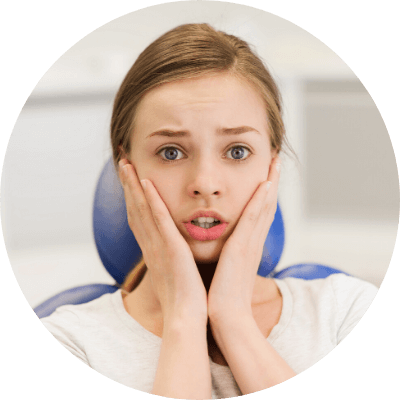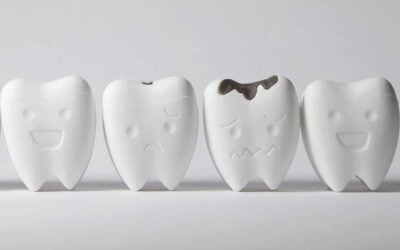Tooth Decay: Babies, Children & Teenagers
Tooth Decay: Babies, Children & Teenagers

What is tooth decay?
Tooth decay is a diet-related disease that damages teeth.
Tooth decay happens when germs in the mouth create a sticky covering called plaque on the tooth surface. These germs feed on sugars in food and drinks and produce an acid that damages the tooth surface. Over time, this acid eats away at the surface of the tooth, creating holes or ‘cavities’.
Tooth decay can cause pain and infection. It can even affect children’s growth. Severe decay in baby teeth can have serious consequences for your child’s nutrition, speech, and jaw development.
The longer tooth decay is left untreated, the more your child will experience:
- pain and discomfort
- a higher risk of new decay in other baby and adult teeth
- more complicated and expensive treatment
- anxiety when he visits a dentist
- loss of time at school.
Tooth decay is also called dental caries.
Signs of tooth decay
Early tooth decay can be hard to spot. The first sign of tooth decay is when teeth develop a dull, white band along the gum line (the area at the base of the teeth, near the gums). You might also see brown spots on the teeth, and the gums might be red and swollen.
With more advanced tooth decay, you might notice blackened holes in the teeth or broken teeth. If the decay has led to an infection, you might notice lumps or pimples on the gums or swelling around the gums and face.
Tooth decay prevention: three key steps
There are three key steps your child can take to prevent tooth decay:
-
- Brush teeth twice a day, using fluoride toothpaste.
- Eat a healthy, low-sugar diet, and develop healthy eating habits.
- Have regular dental check-ups with the dentist.
Healthy eating habits to prevent tooth decay
Healthy eating habits can also prevent tooth decay. This means being careful about when and how your child eats.
For example, the longer food and drink stays in your child’s mouth, the more chance there is for acid to develop and damage tooth enamel. So grazing on foods and sipping drinks over long periods of time is more likely to cause tooth decay.
You can discourage your child from long periods of eating or drinking by:
- having regular snack and meal times, rather than letting your child ‘graze’ all day – aim to leave 1½-2 hours between meals and snacks, including sweet drinks
- making sure your child eats and drinks in one place only – for example, at the table
- putting food away when snack time or mealtime is over
- encouraging your child to drink tap water if he’s thirsty, rather than juice, cordial or soft drink
- giving your child sweet foods as part of a meal rather than as a snack.
“Regular dental check-ups to prevent tooth decay”
Regular dental check-ups can help your child avoid tooth decay. Your dentist will tell you how often your child needs a check-up. Dentists usually recommend every 6-12 months.
If you think your child has tooth decay, it’s important to visit a dentist to stop the decay or infection from getting worse. If your child has signs of being generally unwell, like a fever or facial swelling, and you think these might be because of dental problems, see your GP or go to a hospital emergency department straight away.
Other ways to avoid tooth decay
Being a role model
You can set a good dental health example for your child by brushing your own teeth twice a day, limiting your sugar intake, and being positive about going for dental check-ups.
Bottle-feeding and breastfeeding
It’s recommended that you don’t settle your baby in bed with a bottle of breastmilk or formula. Settling babies to sleep with bottles can lead to tooth decay. This is because there’s less saliva in your baby’s mouth to protect her teeth during sleep, so milk can build up and eat away at the enamel.
Asthma inhalers or puffers
These are a vital part of some asthma management plans, but the powder in some puffers is acidic and can damage tooth enamel. This could lead to tooth decay over time if it isn’t balanced with good dental hygiene.
To avoid tooth decay, rinse your child’s mouth with water immediately after each use of the puffer. Ensure that your child’s teeth are cleaned twice a day with toothpaste. But don’t brush teeth straight after using the puffer – allow 30-60 minutes before brushing.
Other medications
Some medicines can affect your child’s dental health because of their sugar content. Check the labels of medications for any hidden sugars, particularly if your child will be taking the medication for a long time. Always ask for sugar-free medication from your pharmacist.
Some medications can reduce saliva production, which can lead to tooth decay and other dental health problems. Talk to your doctor or pharmacist about the effects of medications on saliva and teeth. Older children and teenagers could try chewing sugar-free gum if they’re using these medications. It stimulates saliva flow and helps to protect teeth from decay.
You can also encourage your child to rinse his mouth with water immediately after taking medication, and to brush with fluoride toothpaste about an hour later.
Sports drinks
The acidity and sugar in sports drinks can cause decay and damage your child’s teeth, particularly if your child drinks them regularly. This can lead to permanent damage to your child’s teeth and further dental treatment.
It’s best for your child to avoid sports drinks, and to drink plenty of water instead. When she does drink sports drinks, it’s good for her to rinse with water straight away and to brush her teeth with a fluoride toothpaste about an hour later.
We would love to discuss preventive measures or treatment of tooth decay for your little ones. Call us now or click here!
To read the original article, click here.
Note: All content and media on the Sunbury Dental House website and social media channels are created and published online for informational purposes only. It is not intended to be a substitute for professional medical advice and should not be relied on as health or personal advice.
Services we mentioned:
More Dental Articles
Is Painless Dentistry Without Needles Possible?
Intravenous sedation is much more full on in terms of heavily sedating the patient. It is usually reserved for those having extensive…
Let The New Year Bring New Commitment To Your Oral Care
If you can be inspired to make one new year’s resolution this year let it be for your dental health. Let the New Year bring new commitment to your oral care in 2024 and beyond. This is no mere dentist’s selfish wish but a call for an understanding about just how...
What’s New In Tooth Decay? Another Bacteria, That’s What
Four is quite a significant number to us humans. We like it. We live by it. The Chaldeans of Babylon loved it for their system of terrestrial and meteorological phenomena that told an astrological future encompassing earth, water, air and fire. Aristotle ascribed...
Your Tooth Bone’s Connected To Your Knee Bone …
Dem bones dem bones dem dry bones … 1928 marked the first recording of that spiritual song, written by two African-American brothers James Walden and J. Rosomond Johnson. Born in 1871, James Walden Johnson was a skilled writer, distinguished lawyer, diplomat and civil...
















